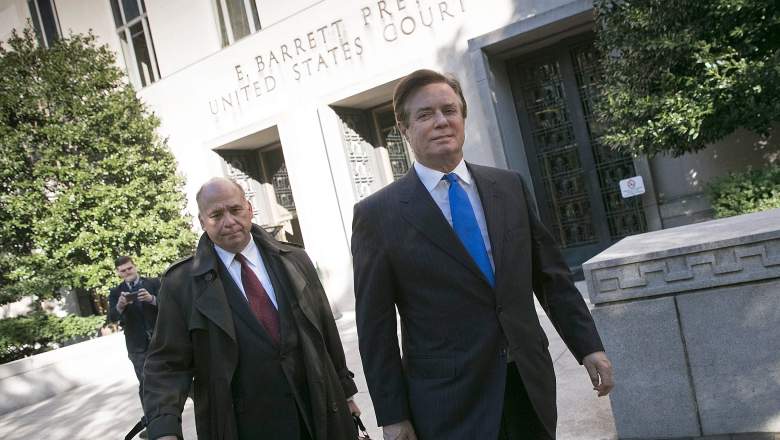
Getty Former campaign manager for U.S. President Donald Trump, Paul Manafort (R), leaves U.S. District Court after pleading not guilty following his indictment on federal charges on October 30, 2017 in Washington, DC.
The long-awaited indictment in the Justice Department’s probe into Russian interference in the 2016 elections alleges that Paul Manafort and his associate, Rick Gates, lobbied the U.S. government on behalf of a foreign nation, lied to the federal government about it, and laundered millions of dollars earned in the process.
Here are the 12 charges laid out:
Count One: Conspiracy Against the United States
The first charge against Manafort and Gates is that they “knowingly and intentionally conspired to defraud the United States by impeding, impairing, obstructing, an defeating the lawful governmental functions of a government agency,” the indictment reads.
Conspiracy against the United States is criminalized in 18 U.S. Code § 371:
If two or more persons conspire either to commit any offense against the United States, or to defraud the United States, or any agency thereof in any manner or for any purpose, and one or more of such persons do any act to effect the object of the conspiracy, each shall be fined under this title or imprisoned not more than five years, or both.
The maximum punishment for the charge is five years in prison.
Prosecutors lay out their case for conspiracy throughout the bulk of the document, citing Gates and Manafort’s work “as unregistered agents of the Government of Ukraine … [generating] tens of millions of dollars in income” as a result.
The indictment alleges that, from 2006 until 2014, Manafort and Gates lobbied U.S. officials on behalf of the Ukraine’s Party of Regions (a pro-Russia party), former president Victor Yanukovych (who was ousted in the 2014 revolution), and the Ukrainian government.
Agents that lobby on behalf of foreign entities are required by law to register with the U.S. government under the Foreign Agents Registration Act of 1938; Gates and Manafort failed to do so.
The indictment cites an email exchange between Gates and two lobbying firms contracted by Gates and Manafort, wherein Gates instructs the firm that it would be “representing the Government of Ukraine in [Washington] D.C.”
An April 2012 memorandum from Manafort to Yanukovych details the progress of the “project,” and declares his intent to update the Ukrainian president weekly. The two firms, referred to only as “Company A” and “Company B,” lobbied members of Congress and staff on topics such as, “Ukrainian sanctions, the validity of Ukrainian elections, and the propriety of Yanukovych’s imprisoning his presidential rival.”
According to the indictment, Manafort and Gates concocted a cover story for their activities after Manafort’s Ukrainian connections were exposed by the media in August 2016. Another email exchange between Gates and one of the lobby firms provided the firm with a series of hypothetical questions and false answers with which to respond.
Count Two: Conspiracy to Launder Money
The indictment alleges that Manafort earned millions of dollars working for the Ukrainian government, and that he used that money to fund a “lavish lifestyle” living in the U.S. without reporting the income or paying taxes on it.
The document provides a long list of wire transfers from abroad to various U.S. vendors to pay for purchases, including several properties like a $2.8 million condo in the SoHo neighborhood of Manhattan. The wire transfers, which mostly originated from companies that Manafort set up in Cyprus, total over $21 million.
According the indictment, Manafort used the properties he purchased as collateral to take out loans to the tune of millions of dollars.
This may be the most serious charged levied against Manafort and Gates, carrying a maximum sentence of up to 20 years in prison.
Counts Three through Nine: Failure to File Reports of Foreign Bank and Financial Accounts
These counts deal with Manafort and Gates’ failure to properly disclose foreign assets to the Internal Revenue Service, and describe it as “part of a pattern of illegal activity involving more than $100,000 in a 12-month period.”
According to the IRS website:
United States persons are required to file an FBAR if:
1) the United States person had a financial interest in or signature authority over at least one financial account located outside of the United States; and
2) the aggregate value of all foreign financial accounts exceeded $10,000 at any time during the calendar year reported.
Counts three through six charge Manafort with failing to file an FBAR for the calendar years of 2011 through 2014; counts seven through nine charge Gates with the same for the years 2011 through 2013.
Count Ten: Unregistered Agent of a Foreign Principal
This charge relates to Count One, and charges Manafort and Gates for failing to register as agents of a foreign entity with the Office of the Attorney General.
Count Eleven: False and Misleading FARA Statements
On November 23, 2016, and February 10, 2017, Gates and Manafort belatedly filed as foreign agents under the Foreign Agent Registration Act (FARA), but according to the indictment, their statements were falsified.
Count Twelve: False Statements
This charge is also related to the falsified FARA statements. Here, Gates and Manafort are charged with violating a separate statute:
[They] knowingly and willfully did cause another: to falsify, conceal, and cover up by a scheme and device a material fact; to make a materially false, fictitious, and fraudulent statement and representation; and to make and use a false writing document knowing the same to contain a materially false, fictitious, and fraudulent statement …